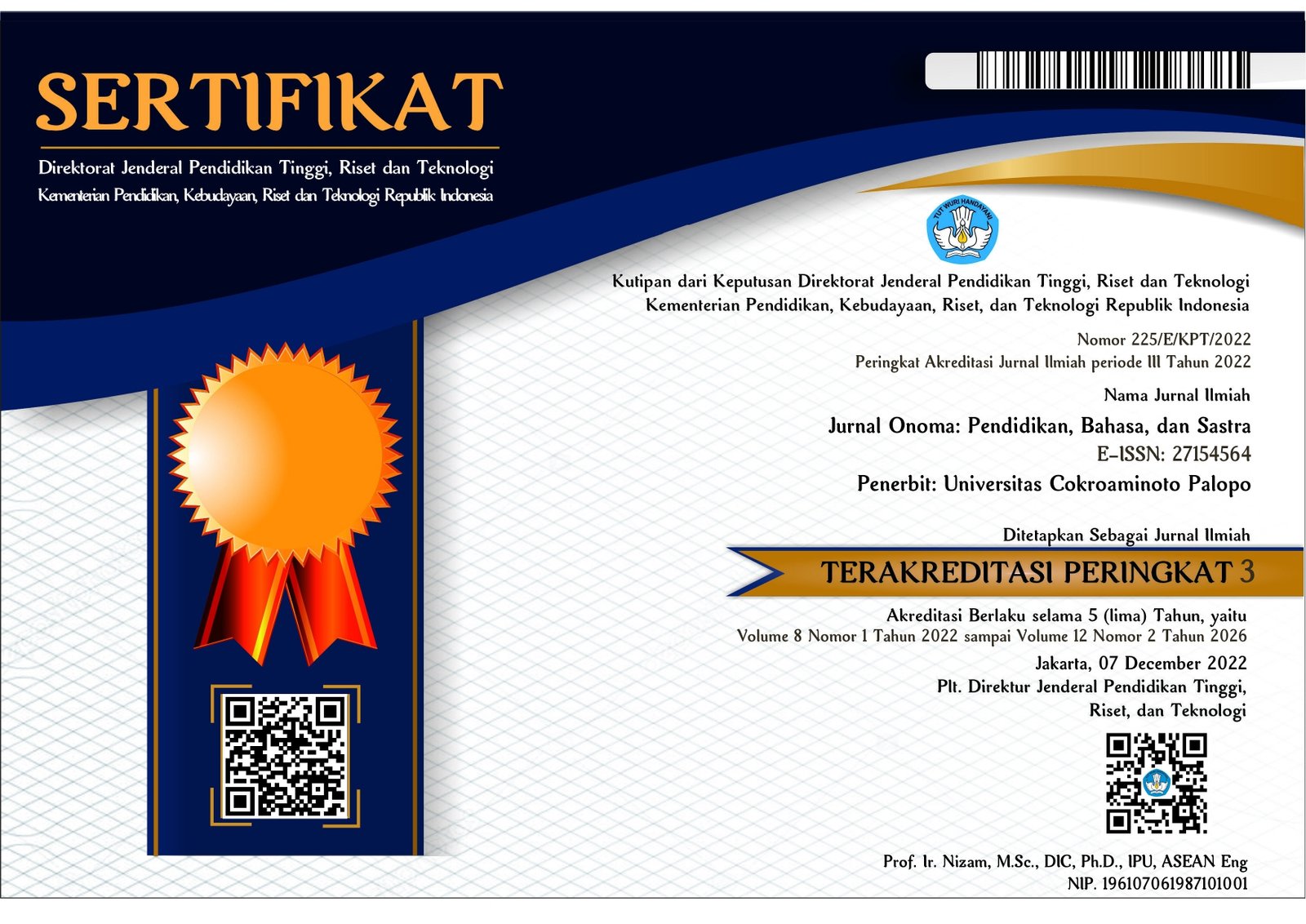Pengaruh Metode Role Playing terhadap Keterampilan Membaca Puisi di Sekolah Dasar
https://doi.org/10.30605/onoma.v10i2.3606
Keywords:
Role Playing, Keterampilan Membaca Puisi, Sekolah DasarAbstract
Tujuan penelitian ini adalah untuk mengetahui pengaruh metode role playing terhadap keterampilan membaca puisi pada siswa sekolah dasar. Penelitian ini menggunakan metode penelitian kuantitatif Pre-Exsperimental Design jenis eksperimen ini One Grup Pretest-Posttest Desingn. Populasi siswa di SD Negeri Gedangan Kecamatan Gedangan Kabupaten Sidoarjo pada kelas IV B yang berjumlah 20 Siswa, diawali dengan prestest lalu diberikan treatment atau obat setelah itu postest dan di uji validitasnya menggunakan statistika uji-T Paired Sampel T-Test menggunakan spss 26. Hasil penelitian Pengaruh Metode Role Playing terhadap Keterampilan Membaca Puisi di Sekolah Dasar pada siswa kelas IV B SDN Gedangan Kecamatan Gedangan Kabupaten Sidoarjo Tahun Pelajaran 2023/2024 dapat disimpulkan adanya pengaruh metode Role Playing terhadap keterampilan membaca puisi. Sebelum adanya metode tersebut rata-rata nilai yang diperoleh siswa membaca puisi 63,4 Sesudah adanya metode tersebut rata-rata nilai siswa membaca puisi meningkat secara signifikan dengan rata-rata nilai 81,7 sehingga siswa tuntas.
Downloads
References
Collins, G., Winardy, B., & Septiana, E. (2023). Social Sciences & Humanities Open Role , play , and games : Comparison between role-playing games and role-play in education. Social Sciences & Humanities Open, 8(1), 100527. https://doi.org/10.1016/j.ssaho.2023.100527
Dahlan, U. A., Afriansyah, F., & Gusti, P. (2020). Keterampilan membaca puisi siswa sebuah modifikasi teknik membaca puisi Jose Rizal Manua. 40(1), 29–38.
Darmuki, A. (2020). Upaya Meningkatkan Kemampuan Berbicara Mahasiswa Menggunakan Media Aplikasi Google Meet Berbasis Unggah Tugas Video Di Youtube Pada Masa Pandemi Covid-19. Jurnal Educatio FKIP UNMA, 6(2), 655–661. https://doi.org/10.31949/educatio.v6i2.687
Fatimah, Dede Siti, Siti Halimah Sadiah, R. B. P. (2019). Analisis Makna Pada Puisi “Kamus Kecil” Karya Joko Pinorbo Menggunakan Pendekatan Semiotika. Pendidikan Dan Bahasa Sastra Indoneisa, 2 Nomor 5(September), 6.
Fika, Y., Meilanie, S. M., & Fridani, L. (2019). Peningkatan Kemampuan Bicara Anak melalui Bermain Peran Berbasis Budaya. Jurnal Obsesi : Jurnal Pendidikan Anak Usia Dini, 4(1), 50. https://doi.org/10.31004/obsesi.v4i1.229
Hanif, S. L. (2018). Peningkatan Keterampilan Membaca Puisi Dengan Eksperimentasi Model Circ Bermedia Video Pembacaan Puisi Pada Siswa Kelas V Sd 1 Tritis Jepara. KREDO : Jurnal Ilmiah Bahasa Dan Sastra, 2(1), 65–80. https://doi.org/10.24176/kredo.v2i1.2784
Hasanah, D. U., Achsani, F., & Akbar Al Aziz, I. S. (2019). Analisis Penggunaan Gaya Bahasa Pada Puisi-Puisi Karya Fadli Zon. KEMBARA: Jurnal Keilmuan Bahasa, Sastra, Dan Pengajarannya, 5(1), 13. https://doi.org/10.22219/kembara.vol5.no1.13-26
Maria Ulfah, S., & Budiman, M. A. (2019). Keefektifan Model Pembelajaran Role Playing Terhadap Kemampuan Berbicara. Journal for Lesson and Learning Studies, 2(1), 83–91. https://doi.org/10.23887/jlls.v2i1.17324
Sari, Y. D. K., Chamisijatin, L., & Santoso, B. (2019). Peningkatan Keterampilan Membaca Puisi Siswa Kelas Iv Dengan Model Demonstrasi Didukung Media Video Pembelajaran Di Sdn 1 Sumbersari Kota Malang. Refleksi Edukatika : Jurnal Ilmiah Kependidikan, 9(2). https://doi.org/10.24176/re.v9i2.3181
Sukma, E. (2019). Literasi Membaca Puisi Guru SD. Jurnal Inovasi Pendidikan Dan Pembelajaran Sekolah Dasar, 3(1), 65. https://doi.org/10.24036/jippsd.v3i1.106325
Supena, I., & Hariyadi, A. (2021). The Influence of 4C ( Constructive , Critical , Creativity , Collaborative ) Learning Model on Students ’ Learning Outcomes. 14(3), 873–892.
Triyono, A. (2021). Penerapan Metode Demonstrasi untuk Meningkatkan Kemampuan Membaca Puisi pada Siswa SDN Pacing. Jurnal Education, 7(4), 1344–1349. https://doi.org/10.31949/educatio.v7i4.1464
Prof. Dr. Sugiyono, Metode Penelitian Kuantitatif, Kualitatif dan R&D. ALFABETA, 2022.
Downloads
Published
How to Cite
License
In submitting the manuscript to the journal, the authors certify that:
- They are authorized by their co-authors to enter into these arrangements.
- The work described has not been formally published before, except in the form of an abstract or as part of a published lecture, review, thesis, or overlay journal.
- That it is not under consideration for publication elsewhere,
- That its publication has been approved by all the author(s) and by the responsible authorities – tacitly or explicitly – of the institutes where the work has been carried out.
- They secure the right to reproduce any material that has already been published or copyrighted elsewhere.
- They agree to the following license and copyright agreement.
License and Copyright Agreement
Authors who publish with Onoma Journal: Education, Languages??, and Literature agree to the following terms:
- Authors retain copyright and grant the journal right of first publication with the work simultaneously licensed under Creative Commons Attribution License (CC BY 4.0) that allows others to share the work with an acknowledgment of the work's authorship and initial publication in this journal.
- Authors are able to enter into separate, additional contractual arrangements for the non-exclusive distribution of the journal's published version of the work (e.g., post it to an institutional repository or publish it in a book), with an acknowledgment of its initial publication in this journal.
- Authors are permitted and encouraged to post their work online (e.g., in institutional repositories or on their website) prior to and during the submission process, as it can lead to productive exchanges, as well as earlier and greater citation of published work.

















